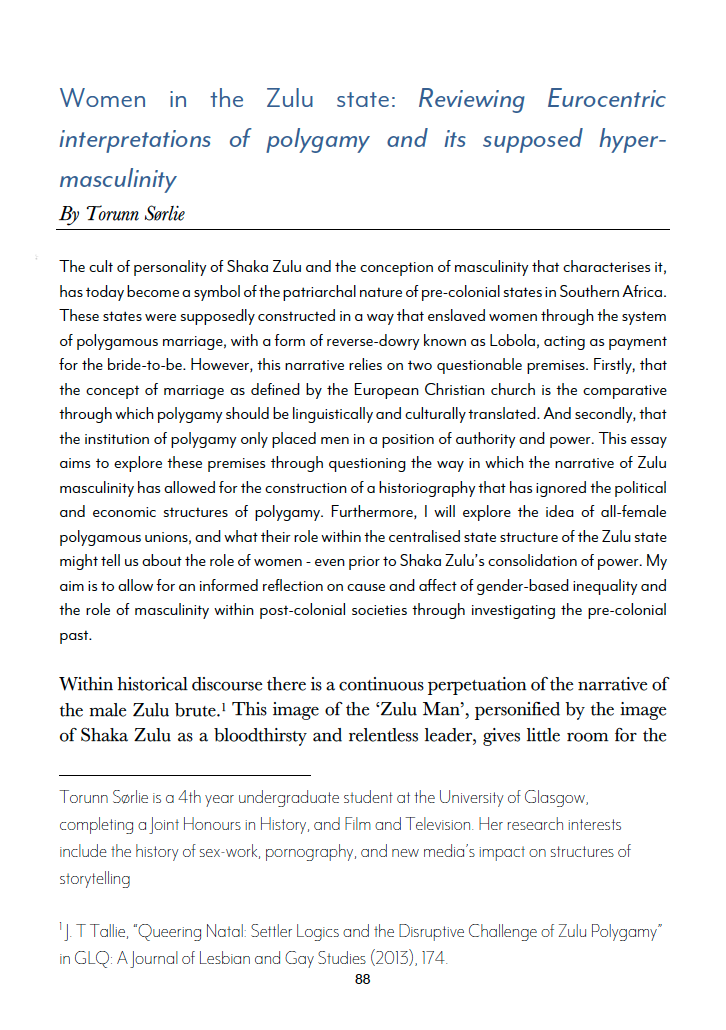Women in the Zulu state
Reviewing Eurocentric interpretations of polygamy and its supposed hypermasculinity
DOI:
https://doi.org/10.36399/GroundingsUG.12.164Keywords:
Lobola, Zulu, Role of Women, Polygamy, Masculinity, EurocentricismAbstract
The cult of personality of Shaka Zulu and the conception of masculinity that characterises it, has today become a symbol of the patriarchal nature of pre-colonial states in Southern Africa. These states were supposedly constructed in a way that enslaved women through the system of polygamous marriage, with a form of reverse-dowry known as Lobola, acting as payment for the bride-to-be. However, this narrative relies on two questionable premises. Firstly, that the concept of marriage as defined by the European Christian church is the comparative through which polygamy should be linguistically and culturally translated. And secondly, that the institution of polygamy only placed men in a position of authority and power. This essay aims to explore these premises through questioning the way in which the narrative of Zulu masculinity has allowed for the construction of a historiography that has ignored the political and economic structures of polygamy. Furthermore, I will explore the idea of all-female polygamous unions, and what their role within the centralised state structure of the Zulu state might tell us about the role of women - even prior to Shaka Zulu’s consolidation of power. My aim is to allow for an informed reflection on cause and affect of gender-based inequality and the role of masculinity within post-colonial societies through investigating the pre-colonial past.
References
Christ, Carol. “Whose History Are We Writing? Reading Feminist Texts With a Hermeneutic of Suspicion” in Journal of Feminist Studies in Religion, vol. 20, no. 2, 2004, pp. 59-82.
Cobbing, Julian. “The Mfecane as Alibi: Thoughts on Dithakong and Mbolompo” in The Journal of African History, vol. 29, no. 3, 1988, pp. 487-519.
Hanretta, Sean. “Women, Marginality and the Zulu State: Women’s Institutions and Power in Early Nineteenth Century” in The Journal of African History, vol. 39, no. 3, 1998, pp. 389-415.
Hunter, Mark. “Cultural Politics and Masculinities: Multiple-Partners in Historical Perspective in KwaZulu-Natal.” in Culture, Health, and Sexuality, vol. 7, no. 3, 2005, pp. 209-223. DOI: 10.1080/13691050412331293458.
Hunter, Mark. “Fathers Without Amandla: Zulu-speaking Men and Fatherhood” in Baba: Men and Fatherhood in South Africa, edited by Linda Richter and Robert Morrell, HSRC Press, 2006, pp. 99-107.
Morrell, Robert. “Of Boys and Men: Masculinity and Gender in Southern African Studies” in Journal of Southern African Studies, vol. 24, no. 4, 1998, pp. 605- 630. DOI: 10.1080/03057079808708593.
Parle, Julie and Scorgie. Fiona. “Bewitching Zulu Women: Umhayizo, Gender, and Witchcraft in KwaZulu-Natal” in South African Historical Journal, vol. 64, no. 4, 2012, pp. 852-875. DOI: 10.1080/02582473.2012.671352.
Sherman, M. L. “Zulu Women” New York Observer, 3 June 1875, p. 173.
Tallie, T. J. “Queering Natal: Settler Logics and the Disruptive Challenge of Zulu Polygamy” in GLQ: A Journal of Lesbian and Gay Studies, vol. 19, no. 2, 2013, pp. 167-189.
Weir, Jennifer. “Chiefly Women and Women’s Leadership in Pre-Colonial Southern Africa” in Women in South African History, edited by Nomboniso Gasa, HSRC Press, 2007, pp. 3-20.
Weir, Jennifer. “‘I Shall Need to Use Her to Rule’: The Power of ‘Royal’ Zulu Women in Pre-Colonial Zululand” in South African Historical Journal, vo. 43, no. 1, pp. 3-31. DOI: 10.1080/02582470008671905.
Worger, William. “Workers as Criminals: The Rule of Law in Early Kimbeley, 1870-1885” in Struggle for the City: Migrant Labor, Capital, and the State in Urban Africa, edited by Frederick Cooper, Sage Publications, 1983, pp. 51-89.

Downloads
Published
Issue
Section
License
Copyright (c) 2019 Torunn Sørlie

This work is licensed under a Creative Commons Attribution 4.0 International License.
The CC BY 4.0 license is a Creative Commons license. This is a non-copyleft free license that is good for art and entertainment works, and educational works. It is compatible with all versions of the GNU GPL; however, like all CC licenses, it should not be used on software. People are free to: Share — copy and redistribute the material in any medium or format; Adapt — remix, transform, and build upon the material for any purpose, even commercially. The licensor cannot revoke these freedoms as long as you follow the license terms. But they must conform to the following terms: Attribution — You must give appropriate credit, provide a link to the license, and indicate if changes were made. You may do so in any reasonable manner, but not in any way that suggests the licensor endorses you or your use. No additional restrictions — You may not apply legal terms or technological measures that legally restrict others from doing anything the license permits.
Please check individual article PDF copies to see if any additional restrictions apply.







